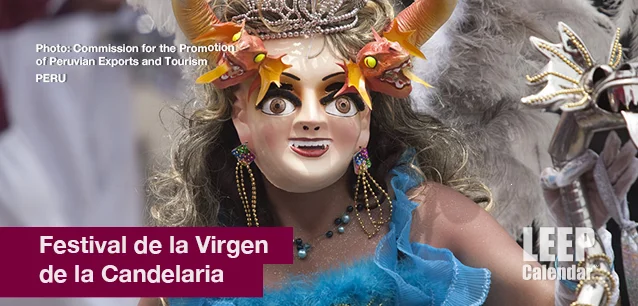 AD
AD
Today is: December 12
Scroll to explore events active on this date.
Additional Events on LEEP
LEEP INK FEATURES

August? Absolutely!
In August, we live through the Dog Days of Summer. It's hot and often humid, and those who can leave for better climates do. Down south, winter is in full force. August is also known as "the ...

In The Heat of July: July 2025 Events
Is it hot enough (or cold enough if you're below the equator) for you yet? There is actually a day for that! Like every month, I pick a diverse collection of events you may or may not know about. This ...

May Blooms: Events in May 2025
Along with October, May is one of the most densely packed months of the year. It's before the summer humidity and the last whole month of the school year. The weather is warming in t...
About La Festival de la Virgen de la Candelaria
Entertainment , Christian
Festivals & Fairs , Brazil & South America
Ends: Feb 14, 2024
DESCRIPTION:
The Festivity of Virgen de la Candelaria, held in Puno, Peru, is one of the most significant cultural events in the country. It has been declared a part of the world's cultural heritage by UNESCO and takes place every February, attracting large crowds worldwide.
The festival honors the Virgin of Candelaria, the patron saint of Puno, and the celebrations involve traditional music, colorful costumes, vibrant dances, and religious processions, bringing together Catholic traditions and indigenous Andean religious customs, making it a unique blend of cultures.
Historical Background:
This festival's origins intertwine with the Catholic faith and indigenous beliefs. According to tradition, the Virgin Mary appeared to the locals as a beautiful woman. When the locals tried to approach her, she disappeared and was replaced by a statue of the Virgin. This miraculous event led to the Virgin of Candelaria being proclaimed the patron saint of Puno.
The festival also incorporates indigenous Andean traditions. Many of the dances performed during the festival illustrate stories about the spirits of the mountains (known as "Apus"), the devil ("Supay"), and various animals sacred to the indigenous peoples of the region.
Experience of the Festival:
The celebration begins on February 2nd, the Catholic feast day of the Virgin of Candelaria. Festivities start with a grand parade that includes different brotherhoods from various communities in and around Puno, each wearing unique costumes and dancing to traditional music.
One of the most captivating parts of the festival is the dance competition, held in the main stadium of Puno. Different dance troupes compete, each performing a traditional dance, like the Diablada (Dance of the Devils), Morenada, or Caporales. These dances often tell stories or depict battles between good and evil.
The festival peaks between February 10-12, with the day-long dance competition in the stadium. During this period, the city of Puno is awash with parades, parties, and processions, creating an atmosphere of festivity and celebration.
For a visitor, the Festivity of Virgen de la Candelaria offers an opportunity to immerse oneself in Peruvian culture. It's a time when the city of Puno comes alive with vibrant colors, traditional music, and a sense of shared cultural pride. The festival is a testament to Peru's rich cultural heritage, uniquely combining Catholic and indigenous traditions.
VIDEOS
SUPPORTING DOCUMENTS
Currently, this event does not have supporting documents.
ADDITIONAL IMAGES
Currently, this event does not have supporting images.
Where would you like to go now?
 AD
AD


/footer-logo.svg)
